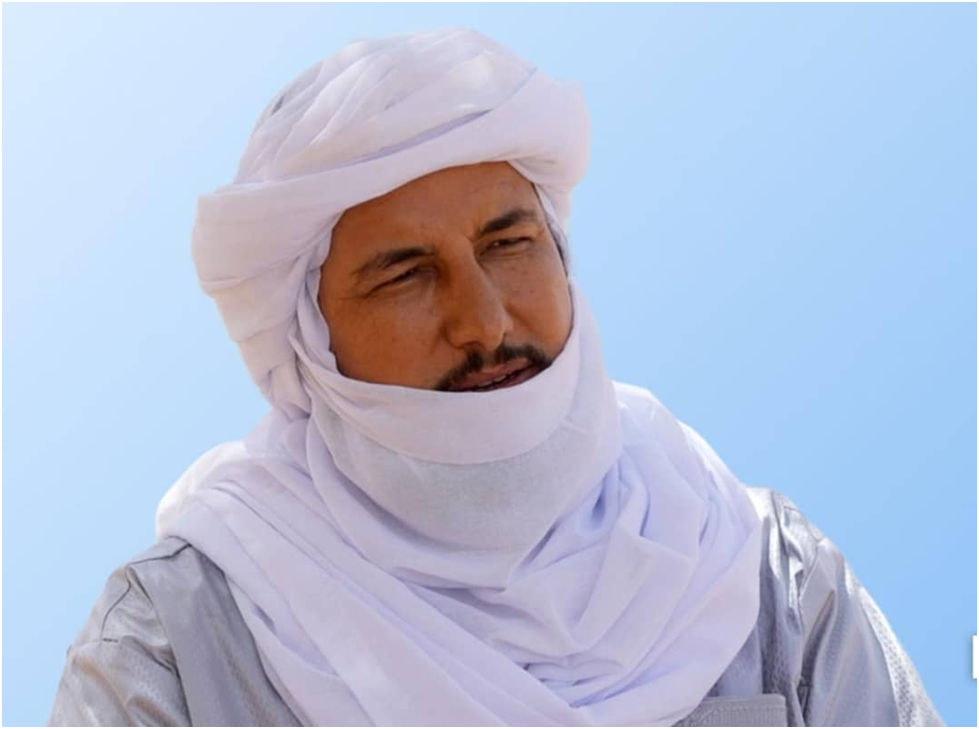
Photo: Bilal Ag Acherif, coordinator of the National Army of Azawad.
As the United Nations Multidimensional Integrated Stabilization Mission (MINUSMA) comes to a close at the end of this month, ICDI’s chairman Jamal Benomar spoke with Bilal Ag Acherif, the coordinator of the National Army of Azawad, about their renewed war with the central government and the Wagner Group. Ag Acherif discussed why the mission failed to establish peace and the consequences for its departure. He argues that a new deal needs to be brokered if the division between North and South, that lies at the heart of the Malian conflict, is to be addressed.
Previously serving as secretary general for the National Movement for the Liberation of Azawad (MNLA) and the president of the Coordination of Azawad Movements (CMA), who signed a UN brokered 2015 agreement, Ag Acherif, now the coordinator of the National Army of Azawad, whose troops are of the CSP-PSD, a framework bringing together two powerful coalitions and Armies of Azawad, spoke to Benomar about why they have renewed their war with the central government or the ‘putschists’ and what prospects there are for peace.
This interview was translated from Arabic and has been condensed for clarity.
Jamal Benomar: The Sahel region has gone through a great deal of tumult in recent years, with numerous coup d’états, the expulsion of French forces and now MINUSMA, and the threat of ECOWAS to stage a military intervention in Niger. Why is this going on now?
When the French occupiers withdrew from the country at the end of the colonial era in the 1960s, they handed over leadership, decision-making centers and sources of wealth to a group that did not take into account other structures, cultures, and identities inside the new borders that had been drawn. Before its departure, France did not take into account the people of northern Mali, and the Azawad issue. Consequently, the seeds of a protracted conflict were sown, and have been repeatedly ignored despite rebellions and wars since the 60s and the 1990 revolution.
The most recent Azawad revolution that broke out by the end of 2010, coincided with the Arab Spring, which turned international attention away from the turmoil in Mali. Therefore, the United Nations Security Council (UNSC) adopted resolutions that were unfair to Azawadiens, since they focused on results rather than the root causes of the conflict and on the proliferation of extremist groups and violence, thus excluding the Azawad political issue. Ill-advised measures were taken by the international and regional actors and military actions were carried out without clear plans to address the roots of the crisis. Furthermore, international forces, be they those of the international community, the United Nations or France, focused on improving relations with the central government in Bamako, at the exclusion of other parties, such as the political movements in Azawad, who were at conflict with the central government. The people of Azawad, thus had little hope that the international community was genuinely willing or even capable of addressing the crisis. This lack of genuine vision, combined with the reaction of the international and regional community to the repeated coups in Mali were exploited by the extremists and the nationalists in Bamako against the people of Azawad. In addition, the international community, led by the UN, fell short of addressing Mali’s central issue for over 10 years: the question of the Azawadiens and the autonomy of Azawad.
JB: What is your overall assessment of the situation in Mali?
The situation of Mali today is the result of all what was mentioned above. However, now, the new putschists’ government in Bamako have sought new friends in their struggle against the Azawadiens and in their endeavor to lump us in with extremist groups like Daesh and Al-Qaeda, from which we are separate. Despite the internationally mediated 2015 agreement between the Azawad movements and the Malian government, the new government, born from the 2020 coup, decided, without officially announcing it, to wage war against the CMA/CSP, targeting the areas controlled by the movements with which it had signed a peace agreement. Furthermore, it has used Wagner mercenaries who have killed and pillaged in Azawad, with the participation and complicity of the Malian army. As a result, the Azawadiens were left with no other choice but to retaliate after several of their sites were attacked by the Malian army and the Wagner mercenaries.
Today, the Azawadiens are waging a war for survival after wearing out all the other means, including the avenues provided by the international community and the Algeria-led international mediation, as well as direct dialogue with the putschists in Bamako. Mali is now engaged in war between the North and the South. Conditions are made even worse by Bamako’s wish to settle all the problems through war and by the part played by the ill-famed Wagner group. Reaching a solution will require a formula that gives Azawadiens autonomy as well as the withdrawal of the putschists from our territory.
JB: What are you fighting for – democracy, a separate state, autonomy or a federal system of states?
Today, based on the practices of the Bamako government and its collaborators, we are fighting to preserve our threatened presence and to manage our own affairs in the best interests of our people and the stability of the region. We want true peace and stability in Kidal, and to achieve sustainable development and secure the return of refugees. For this, we call upon all human rights advocates and those who oppose criminality and racism to support us in stopping the advance of mercenaries and all the other criminal and terrorist organizations in our region. This can only be accomplished if we participate in shaping its future, and the future of the Sahel.
JB: What are the implications for UN withdrawal from Mali?
We regret that after all the sacrifices, such an important UN mission comes to an end having failed to achieve its strategic goals. The international mission’s withdrawal went on along with the escalation of war in the same region where the forces are deployed between the Bamako government’s army and the Wagner mercenaries on the one side and the Azawad army (CMA/CSP), representing the Azawad political movements, on the other. The UN pullout will entail serious consequences for peace and stability. Although the UN mission has not succeeded in establishing peace, it played a crucial role in maintaining stability. Its failure was the result of the political content of the resolution upon which the mission was deployed, as it did not recognize that the problem is the conflict that has been raging on for decades – it focused on issues that resulted from the crisis rather than the causes.
The UNSC must reconsider its errors in addressing the crisis between the North and the South in Mali. The organization still has a moral responsibility, and we call upon it to assume its part and go past the foundations on which the previous resolutions were based.
JB: What are the prospects for a peace process in Mali?
The most important thing today is genuine peace in Mali. It is the foundation if we are to reach a settlement that guarantees to the Azawadiens the right to play their part in their region within a mechanism agreed upon through serious and honest negotiations and not solutions imposed on one side, as was the case in the previous agreement. The other most important goal is security, which should be guaranteed through serious and honest negotiations that respect the grievances of each side, the specificities and history of the conflict and the aspiration of the population that suffered so much from the protraction and consequences of the conflict.
JB: Who do you see best placed to play the role of an effective impartial mediator in the conflict in Mali and the Sahel more broadly?
Pursuing direct interests and preconceived ideas on parties or on one of the parties are incompatible with honest mediation. An efficient mediator needs to be capable of mobilizing the regional and international communities to obtain the needed support for any eventual future agreement. It will be hard for any state on its own to guarantee all of these parameters, given the complexity of the crisis, the deep divergences between the parties to the conflict and the direct or indirect involvement of new parties. Regardless of the future mediator, it is necessary to take into account the errors of the previous agreements, particularly from the Azawadiens’ point of view. There is no doubt that the Malian people, in general, want peace, development and a new regime.







